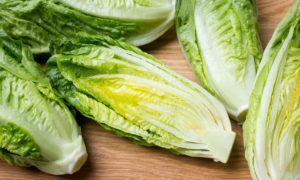 (Gloucester Township, NJ) – Freeholder Carmen Rodriguez, liaison to the Camden County Department of Health and Human Services, wants consumers to know that the CDC has called for a ban on a romaine lettuce due to an Escherichia coli (E. coli) outbreak
(Gloucester Township, NJ) – Freeholder Carmen Rodriguez, liaison to the Camden County Department of Health and Human Services, wants consumers to know that the CDC has called for a ban on a romaine lettuce due to an Escherichia coli (E. coli) outbreak
“Do not buy any products containing romaine lettuce products, and throw away any romaine lettuce you have in your home, even if some of it was eaten and no one has gotten sick,” Rodriguez said. “You should also thoroughly wash and sanitize your refrigerator or anywhere in your kitchen where the romaine was stored.”
Consumers who have any type of romaine lettuce in their home should not eat it. This includes all types or uses of romaine lettuce, such as whole heads of romaine, hearts of romaine and bags of precut lettuce and salad mixes that contain romaine. If you do not know if the lettuce is romaine or whether a salad mix contains romaine, do not eat it and throw it away.
Take action if you have symptoms of an E. coli infection:
- Talk to your healthcare provider.
- Write down what you ate in the week before you started to get sick.
- Report your illness to the health department.
- Assist public health investigators by answering questions about your illness.
E. coli are bacteria found in the environment, foods, and intestines of people and animals.
Most E. coli are harmless and are actually an important part of a healthy human intestinal tract. However, some E. coli can cause diarrhea, urinary tract infections, respiratory illness, bloodstream infections, and other illnesses. The types of E. coli that can cause illness can be transmitted through contaminated water or food, or through contact with animals or people. Individuals usually get sick from E. coli between two and eight days after swallowing the germ.
“This is a public health crisis and until the origin of the outbreak is identified no one should be consuming romaine, whether it is in a restaurant or at home,” Rodriguez continued. “The Health Department will keep the public apprised of any changes as this situation evolves and if the outbreak impacts our community.”
